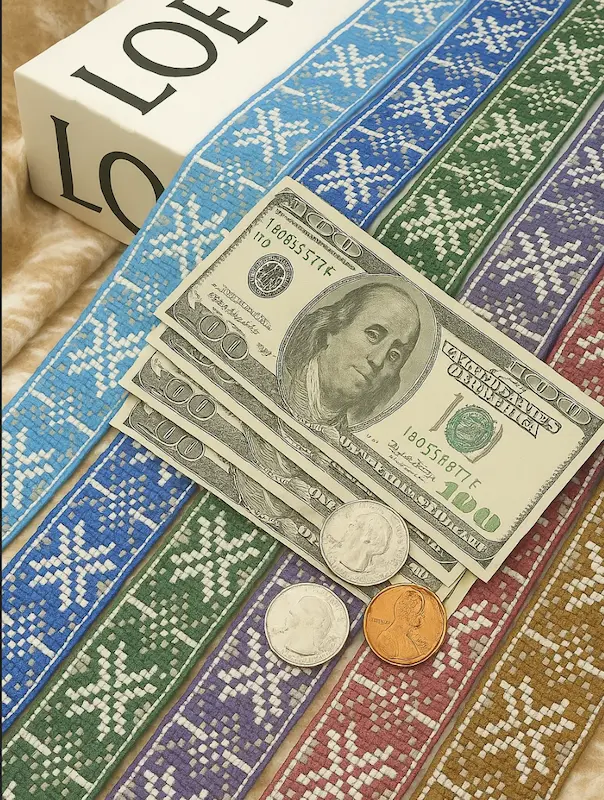One of the most common questions we receive as a webbing manufacturer is, "Why does the webbing price vary so much between suppliers?" It's a valid question. When you see two seemingly identical straps with vastly different price tags, it’s natural to wonder what justifies the difference. The answer is simple: you get what you pay for. A webbing's price is a direct reflection of its raw materials, manufacturing process, and quality control.
In this guide, we'll pull back the curtain and break down the factors that determine webbing cost, showing you why investing in quality is crucial for your product's performance and your brand's reputation.
Factor 1: The Heart of the Matter – Raw Materials
The single largest driver of webbing price is the quality of the yarn. Just like in cooking, the final dish is only as good as its ingredients. This is where the biggest price discrepancies arise.
Case Study: Polypropylene (PP) Webbing
Let's look at Polypropylene (PP) webbing, a popular choice for many applications. On the market, you'll find three main grades of raw material, each with a different cost and performance profile:
- 100% Virgin (New) Material: This is the highest quality and most expensive option. Virgin PP offers superior strength, excellent UV resistance, and vibrant, consistent color. For any product where reliability is key, this is the only acceptable choice. This is the standard at TMG Webbing.
- Mixed (New + Recycled) Material: To cut costs, some suppliers blend virgin material with recycled flakes. The price is lower, but performance becomes unpredictable. Strength, color consistency, and lifespan are all compromised.
- 100% Recycled Material: This is the cheapest option, often used in low-cost, disposable items. Webbing made from fully recycled material can be brittle, has poor resistance to sunlight (leading to rapid degradation), and may contain impurities that affect its safety and strength. As we covered in our guide on choosing the right material, using this for the wrong application can be a hidden danger.
Case Study: Elastic Webbing
The same principle applies to elastic webbing. The price difference often comes down to the rubber threads inside. High-quality elastic bands use imported latex or rubber threads (often from Thailand or Malaysia), which offer superior elasticity, durability, and a longer lifespan. Cheaper alternatives use domestic or lower-grade rubber that can lose its stretch quickly, becoming saggy and useless.
Factor 2: The Manufacturing Machine
Once you have the raw materials, how they are processed matters. The cost of manufacturing is influenced by:
- Machinery: Modern, high-speed needle looms are a significant capital investment, but they produce webbing with a tighter, more consistent weave and higher efficiency. Older, slower machines are cheaper to run but can result in lower quality and inconsistencies.
- Labor: Skilled technicians are required to set up, calibrate, and monitor the weaving and dyeing processes. Their expertise ensures that every batch meets specification. Lower-cost operations may cut corners on skilled labor, leading to quality control issues.
- Dyeing & Finishing: Achieving a perfect, consistent color that won't bleed or fade is a complex, multi-step process. Using certified, eco-friendly dyes (like those compliant with OEKO-TEX standards) costs more than using cheaper, potentially harmful chemicals.
Why a Lower Webbing Price Can Cost You More
Choosing a webbing supplier based on the lowest price alone is a risky strategy. The initial savings can be quickly erased by the costs of product failure, customer complaints, and damage to your brand's reputation. A strap that breaks on a backpack, a tie-down that fails under load, or a safety harness that degrades in the sun are not just quality issues—they are liabilities.
At TMG Webbing, we believe in transparent pricing that reflects true value. By using only 100% virgin raw materials and investing in skilled manufacturing, we produce webbing that you and your customers can trust. We provide a fair webbing price for a product that performs flawlessly, protecting your investment and your brand.
Ready to source webbing where quality is guaranteed? Contact our team of experts today for a quote and to discuss the specific needs of your project. We're here to help you make the right choice.

